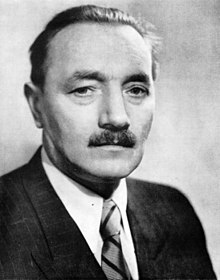Bolesław Bierut
| Bolesław Bierut | |
|---|---|

Bolesław Bierut
|
|
| President of the Republic of Poland | |
|
In office 5 February 1947 – 21 November 1952 |
|
| Prime Minister | Józef Cyrankiewicz |
| Preceded by | Himself as President of the Popular Council |
| Succeeded by | Office abolished Aleksander Zawadzki (as Chairman of the Council of State) Wojciech Jaruzelski (After office was restored) |
| President of the Popular Council | |
|
In office 31 December 1944 – 4 February 1947 |
|
| Prime Minister | Edward Osóbka-Morawski |
| Preceded by |
Władysław Raczkiewicz as President in Exile |
| Succeeded by | Himself as President of Poland |
| Secretary General of the Central Committee of the PUWP | |
|
In office 22 December 1948 – 12 March 1956 |
|
| Preceded by |
Władysław Gomułka as Secretary of PWP |
| Succeeded by |
Edward Ochab as First Secretary |
| Prime Minister of the People's Republic of Poland | |
|
In office 21 November 1952 – 18 March 1954 |
|
| Preceded by | Józef Cyrankiewicz |
| Succeeded by | Józef Cyrankiewicz |
| Personal details | |
| Born |
18 April 1892 Rury, Lublin Governorate, Congress Poland |
| Died | 12 March 1956 (aged 63) Moscow, Russian SFSR, Soviet Union |
| Political party |
Communist Party of Poland Polish Workers' Party Polish United Workers' Party |
| Spouse(s) | Wanda Górska (1903-1983) |
| Religion | Roman Catholicism (Lapsed) |
Bolesław Bierut ([bɔˈlɛswaf ˈbjɛrut]; 18 April 1892 – 12 March 1956) was a Polish Communist leader, NKVD agent, and a hard-line Stalinist who became President of Poland after the Soviet takeover of the country in the aftermath of World War II.
Bierut was born in Rury, now a part of Lublin, to Wojciech Bierut, a village teacher, and his wife Maria (née Biernacka). In 1918 he took courses at the Warsaw School of Economics. From 1924–30, he was in Moscow for training at the school of the Communist International.
In 1930–31, he was sent by the Comintern to Austria, Czechoslovakia and Bulgaria. In 1933 he became an agent of Soviet military intelligence, the GRU, and subsequently, was sentenced in Poland to 10 years in prison for "anti-state activities" (incarcerated between 1933–1938). The pro-Soviet Communist Party of Poland was dissolved by Joseph Stalin in 1938. Bierut avoided being caught in the Great Purge, which led to the execution of many leaders of the Communist Party of Poland in the USSR. After an amnesty from the Polish government in 1938 Bierut settled down in Warsaw and worked as a bookkeeper in a cooperative.
After the outbreak of World War II, Bierut left Warsaw and through Lublin went to eastern Poland, which was soon occupied by the Red Army. Bierut spent part of the war in the Soviet Union, but was sent to Poland to join the leadership of the new Polish Workers' Party (PPR) in 1943. He headed the State National Council (Krajowa Rada Narodowa), a communist quasi-parliament established by Władysław Gomułka and the PPR, from 1944 to 1947. With Gomułka and others, Bierut played a leading role in the establishment of communist Poland.
...
Wikipedia
